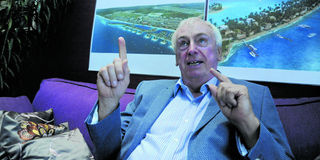Man behind the Sh2tr Z’bar tourist resort speaks

Amber Director Brian Thomson speaks to journalists about the envisaged Zanzibar Tourist Resort, to be put up by a British firm, Pennyroyal during a press conference in Unguja on Friday. The entire project is expected to cost $1 billion (Sh2.1 trillion).PHOTO | SALIM SHAO
What you need to know:
Named Zanzibar Amber Resort, it will be built in Matemwe Village, between Mwangaseni and Kigomani areas on the archipelago, which will now be transformed economically.
On the coastal site of North-East Unguja in Zanzibar, a mega tourist resort worth $1 billion (Sh2.1 trillion) is coming up, thanks to a British firm, Pennyroyal Gibraltar.
Named Zanzibar Amber Resort, it will be built in Matemwe Village, between Mwangaseni and Kigomani areas on the archipelago, which will now be transformed economically.
People’s main economic activity in the area is seaweed farming and fishing.
The man behind the investment, Mr Brian Thomson, speaks to The Citizen’s reporter Syriacus Buguzi on the milestones the construction resort has attained so far. Excerpts:
Qn: How did the idea to build such a resort come about? Or rather, whose brain-child is the project?
Ans: (Laughter)...I am afraid to say, it’s my brain child. The whole concept of this project evolved from my kitchen table with my colleague, who is also an architect. I have been dealing with construction and engineering my whole life. I reached a point where I felt I have to do one legacy project, so, we had the idea and what I did is that I poured in all the things I had seen and liked in places that I have always travelled to. So, we developed the idea over five years ago. It was not an overnight experience. The construction will take more than 8 years to complete. That was the first step and in my opinion, the idea we had will soon give birth to East Africa’s most unique holiday destination.
Qn: And, why Zanzibar, specifically the North Eastern part?
Ans: I looked around in Mauritius, there was a holiday home. It dawned on me that I could invest in the same project in East Africa. Then, I turned my interest to Zanzibar, which in my view, is like an “undiscovered jewelry.” I am very fortunate to have come and found it close to the sea and then develop it from there. It has every criterion that every international resort would require.
Qn: But it’s very close to the sea and I would say there is a high risk of Tsunami. How safe do you think the resort will be, geographically?
Ans: Our decision has been guided by information provided by the Tsunami Research Organisation. Our engineers have researched well on that aspect and we are very comfortable with the location. We are very cautious as we go forward. And, we will be carrying out further Seismic Surveys during the construction to make sure that there are no voids underneath. We will put extra controls and we are employing a very cautious engineering approach
Qn: And, how did you approach the government authorities as you embarked on the project.
Ans: It was not a straight path. Not easy at all. The project is so big and it covers every ministry. So we have had to deal with all the ministries. Some are very active and others are not. Even now, we are still working on some of our documentation. We expect that before Christmas, we will have all our documents completed. I couldn’t say it was easy, though.
Qn: I have seen heavy machines that are already at work. It appears you are laying ground work for the project. Take us through the milestones of the construction.
Ans: The entire project has seven phases. The first phase is the most important one. It’s made up of five main apartment blocks, adding up to 380 apartments. But the most important thing is the Golf Course, the Marina and the entire infrastructure that must be in place in the same time frame, because, when the clients begin arriving in three years’ time, they don’t want to be going through a construction site. They need to have a nice access entrance to the hotels—the five star hotels that will be functional. From there on, the phases will develop according to the market demand. The second phase will carry on from the first phase and this will include the water park, and progressively, we will be moving in to build the airport. We want to construct the state-of-the-art hospital and an international school, so that people will not have to send their children overseas for education.
Qn: How will the airport operate? And, there could be concerns of illegal businesses through the airport system. How have you addressed that?
Ans: The airport is intended to be private. We are looking at clients who will be coming to the high quality hotels and a number of clients who would wish to arrive in their own private jets. The traffic in the air is expected to be ten planes a day. The airport itself is 3000 metres long. We are intending to offer villas where one can come in with a private jet and park. The airport construction will cost around $20 million. For sure, there could be concerns of illegal business but the airport will be run by the aviation authorities. So the customs and all the securities will be run just as one would be arriving at a public airport. Traffic in the sea is controlled so we wouldn’t expect any increased exposure to problems.
Qn: Oh! That’s quite a huge investment. What market are you targeting then? Is there a point where you target the local people in Zanzibar or in Tanzania?
Ans: We are targeting countries with very strong interest, South Africa is one of them, Kenya, the East Coast, and then on to Kuwait, and the Arab Emirates. You can map the growth of Zanzibar by the increase in the number of airplanes from different countries that are arriving directly to the island. The market will be for the high end. We are a completely different product. We are targeting a situation where someone (a wealthy person) could come in to the resort and go. That isn’t really an angle for the local people.
Qn: How did you make sure that you (the investors) get along with the local people in the area of investment? And, how will your investment be of benefit to them?
Ans: We take that very seriously and we recognise it’s not a simple thing to do. We realise that we have come to an area where we need to learn the environment and the people. So what we have started with, now, before even we go into the heavy construction, is to do an environmental health and social assessment of the area.
We are engaging with the locals from the seven districts that we consider close tour location. And our baseline study shows that there are 1000 households.
We’ve gone through and talked to 100 households, to try and hear what their concerns are.
We then linked up with the ministries of education and health, and we are now going to set up a plan to bring in the basics that they need,
and on top of that, to bring in the education and training to prepare them for the next three years when there will be jobs for them in the operation of the resort.
Between now and then, we will have a thousand jobs for construction activities.
So, the whole emphasis is to try and train people and see how to fix them in employment.
Zanzibar is one of the areas with high unemployment and that’s part of our priorities—to create jobs.
We had to bring in the infrastructure that didn’t even exist, such as a 10 km road that didn’t exist, bring the electricity and water, but above all, to try and integrate the communities.
We get what we need but fund the community for what they need. Apart from that, the climate is fantastic and the people are quite good to be with




